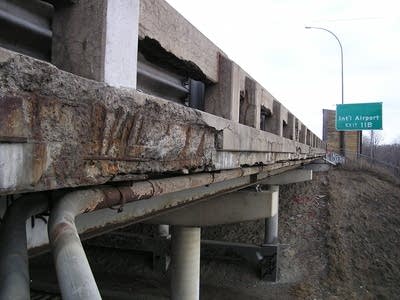State gets Crosstown project bids
Go Deeper.
Create an account or log in to save stories.
Like this?
Thanks for liking this story! We have added it to a list of your favorite stories.

The bid from a group lead by Osseo-based C. S. McCrossan contractors is $316 million. The other bid from a group including Burnsville-based Ames Construction is just over $288 million.
Last year contractors boycotted the state's invitation to submit bids for rebuilding the Crosstown Commons. They said the state's cost estimate of $250 million was unrealistically low.
Contractors also balked because the state asked them to use their own money to finance some of the first phases of construction with a promise from the state they would be paid back.
Some changes have been made.
Turn Up Your Support
MPR News helps you turn down the noise and build shared understanding. Turn up your support for this public resource and keep trusted journalism accessible to all.
First of all, the price has gone up.

Also, Dave Semerad says, the state has had a change of heart about a financing mechanism. Semerad is the CEO and executive director of the Associated General Contractors of Minnesota whose members include companies that build Minnesota's roads and bridges.
The change is due in part to finding money for the project. MnDOT dipped into funds for untangling two other Twin Cities bottlenecks and shifted the cash to pay for the Crosstown projects.
The Crosstown Commons is the intersection of Interstate 35W and state Highway 62. It is located on the boarder of south Minneapolis and the city of Richfield. It mixes traffic from four directions across six lanes and a collection of ramps.
On most weekdays and many weekends the maneuvering of drivers to get to their desired lane causes traffic to slow to a crawl.
MnDOT engineer and Crosstown construction project manager Tom O'Keefe says that will change with the new interchange.
"For an example if you're southbound on 35W out of Minneapolis and you want to continue south bound today you have to merge left, you're forced to merge left in the commons area. When this project is done if you want to make that movement you'll just continue on 35 straight through," O'keefe says.
He adds the interchange will double in size to 12 lanes, including room for a long-sought but still unfunded bus rapid transit service.

The Crosstown interchange, O'Keefe says, will be open during construction.
"We're going to keep the same of number of lanes open through the project area as exist today. The exception would be for some weekend and overnight closures," he says.
During construction, O'Keefe says the interchange will be widened so that half can be shut down and rebuilt while the remaining half with additional lanes will handle traffic.
During the construction, life for Crosstown drivers and neighbors won't be pretty.
Richfield Mayor Debbie Goettel expects lots of drivers will dive onto city streets and wind their way through neighborhoods. Complicating the process, Goettel says, is Richfield sewer construction.
There'll be even more mayhem for Richfield residents.
Besides the Crosstown and sewer line construction, Target and Home Depot will be putting in new stores on two of the city's busier streets.
Life for Minneapolis residents living in the city's 11th ward next to the Crosstown project will also be hectic.
Eleventh ward council member Scott Benson suggests there is a bright side once the project is done.
"One of them being a commitment to bus rapid transit in the corridor, increased use of transit in that corridor as well," he says.
Can the state keep a lid on the projected Crosstown Commons reconstruction price tag of $285 million? The AGC's Dave Semerad declines to speculate but offers this caution.
"You really don't fully understand all of the factors that figure into the price of a project until you go through a detailed project evaluation and estimating process."
Translation:
Transportation experts say the Crosstown's price tag could easily top $300 million given the inflation rate of steel, concrete and other building materials that is running between 8 and 12 percent.
The state has 60 days to evaluate the two bids and is bound by state law to accept the lowest one.



